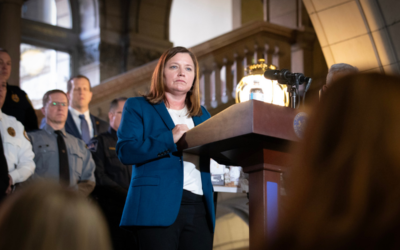
Image via Shutterstock
The Democrats’ “Safe at Home” package would extend the moratorium on evictions and foreclosures and increase assistance to renters, homeowners, and small “mom and pop” landlords.
It’s been nearly two weeks since Pennsylvania’s eviction and foreclosure moratorium expired, and while state Democrats have introduced a package of bills to help protect homeowners and renters, Republicans who control the legislature have so far refused to consider the legislation.
Unless that changes, nearly 400,000 Pennsylvanians—approximately 17% of renters in the state—are at risk of being evicted, according to the Housing Alliance of Pennsylvania.
“Pennsylvania is still racing toward an eviction cliff when thousands of families will face months of unpaid rent and fees,” Gov. Tom Wolf said at a press conference earlier this week in Lancaster County. “We must address the mounting rent debt to help tenants stay in their home and allow landlords to pay their mortgages.”
Wolf, a Democrat, previously used executive orders to extend the state Supreme Court’s moratorium, first issued in March, through Aug. 31, but announced in late August that the state’s Emergency Services Code did not allow him to extend it past that date. The governor called on lawmakers in the General Assembly to pass legislation to extend the moratorium, and Democrats quickly introduced a series of bills to do just that.
The “Safe at Home” package includes bills that would:
- grant Wolf the ability to extend the moratorium on evictions and foreclosures;
- increase funding for the PA Housing Finance Agency to provide additional assistance to renters and homeowners. The bill would also set aside a portion of the funding for smaller, in-state “mom and pop” landlords;
- allow tenants who fell behind on rent due to coronavirus-related job losses or slowdowns to arrange payment plans with landlords to ensure back rent is paid in a reasonable timeframe;
- prohibit late fees on overdue rent or mortgage payments tied to coronavirus-related job losses or slowdowns;
- create a landlord-tenant mediation program to try and prevent eviction proceedings;
- guarantee that low-income renters and homeowners in debt have qualified legal representation in disputes with landlords and management companies;
- seal and expunge the records of any and all “not for cause” evictions—cases in which the court does not find that a tenant breached a lease—so that families have less difficulty finding another place to live;
- waive all interest and fees associated with homeowners refinancing their loans during any declared disaster emergency;
- ensure that small “mom and pop” landlords can access financial assistance through the Home Emergency Mortgage Assistance Program;
- protect people facing job loss or slowdowns during a declared disaster by prohibiting landlords from reporting late or unpaid rent to credit reporting agencies.
The House Democratic Housing Working Group, which was formed to help renters, homeowners in debt, and small “mom and pop” landlords during the novel coronavirus pandemic, released a statement about the legislation last week.
“We will not stand by and watch tens of thousands of Pennsylvanians be pushed out of their homes. The health and economic consequences of the pandemic continue, and with winter just around the corner we are doubly committed to keeping people in their homes,” the group said. “Mass foreclosures and evictions would be bad for Pennsylvania: our families and our economy. We are confident the Republican majority in the House sees the crisis as clearly as we do, and we call on Speaker Cutler to join us and expedite consideration of the following bills to keep people Safe At Home.”
Speaker Bryan Cutler (R-Peach Bottom) did not respond to The Keystone’s request for comment. Nor did Senate Majority Leader Jake Corman (R-Centre County), nor Senate Majority Caucus Chairman Bob Mensch (R-Montgomery County).
The Keystone also reached out to six rank-and-file Republican representatives to ask whether they supported the protections for homeowners, tenants, and “mom and pop” landlords:
- Rep. Meghan Schroeder (R-Bucks County)
- Rep. Todd Polinchock (R-Bucks County)
- Rep. Wendi Thomas (R-Bucks County)
- Rep. Susan Helm (R-Dauphin County)
- Rep. Andrew Lewis (R-Dauphin County)
- Rep. Christopher B. Quinn (R-Delaware County)
None of the six responded.
Rep. Malcolm Kenyatta (D-Philadelphia) called out Republicans this week for not taking action.
“Right now, we’ve got no commitment from the majority party to run any of these bills,” Kenyatta said in a video uploaded to YouTube. “We cannot allow folks to be thrown out on the streets during a pandemic. It’s wrong.”
Wolf has also asked the legislature to improve the state’s $175 million CARES Rent Relief program by easing requirements for eligible tenants, eliminating administrative hurdles that have made it harder for tenants to qualify for assistance, and raising the monthly cap on payments to entice more landlords to participate. According to the Pennsylvania Housing Finance Agency, which oversees the program, only $3.3 million in assistance was approved for just 1,765 tenants in August, in part due to the complicated application process.
Republican legislators do not seem willing to meet Wolf’s request.
The GOP’s priority is to “get our economy moving again and end the stagnation from Gov. Wolf’s unilateral and overbroad shutdown,” House GOP spokesperson Jason Gottesman, told the Associated Press this week. “The best form of economic recovery is a steady job, not more government programs.”
While state-level unemployment figures for August are not yet available, Pennsylvania’s unemployment rate was 13.7% in July—the fifth highest rate in the nation—meaning any widespread economic recovery remains a ways off.
A recent Centers for Disease Control and Prevention order has halted some evictions nationwide through Dec. 31, but other renters remain at risk. The order also does not stop foreclosures, nor does it relieve renters of the back rent they owe. It simply kicks the can down the road until the new year—which could lead to a spiraling homelessness crisis in the dead of winter, according to Wolf.
“If the legislature does not act to fix the state’s relief program, even more families may be facing homelessness on Jan. 1, during the coldest time of the year,” the governor said in his statement. “That would be terrible for families.”

Central PA school board director cancels himself over gay guest speaker fallout
The Cumberland Valley School Board director resigned in protest on Monday after the board voted to reinstate Maulik Pancholy. The board originally...

New book details how Dave McCormick profited from 2008 financial crisis
Dave McCormick forged a relationship with Ray Dalio, the founder of Bridgewater Associates, in early 2008 and was rewarded with a job at Bridgewater...

18,000 PA residents who attended the Art Institute have student loans forgiven
The Biden administration announced last week they were forgiving student loans for 317,000 borrowers who attended the Art Institute. This will help...

Rep. Mike Kelly benefits from Inflation Reduction Act after voting against it
Congressman Mike Kelly was an outspoken critic of President Joe Biden’s climate change legislation but that didn’t stop him from using solar credits...

American Rescue Plan delivers computers and laptops for schools, libraries, nonprofits
President Joe Biden’s American Rescue Plan continues to deliver for Pennsylvanians. 12,000 residents annually will be eligible for computer devices...





